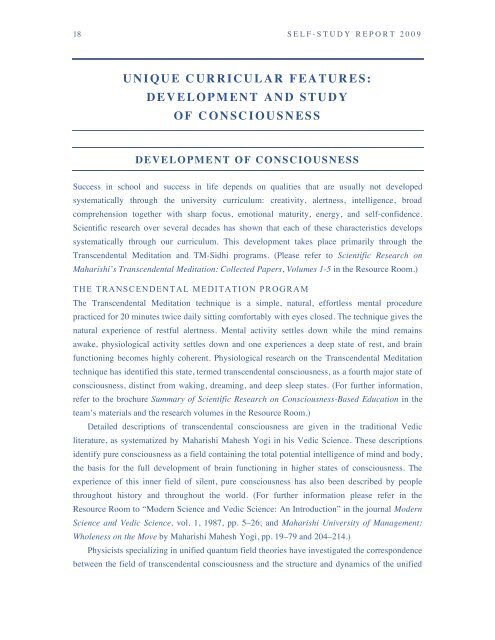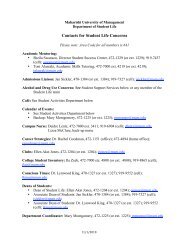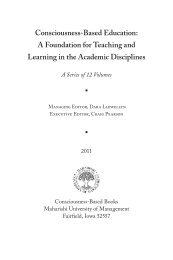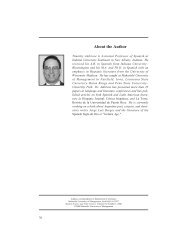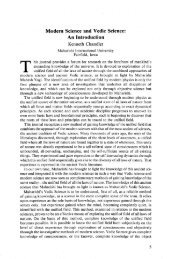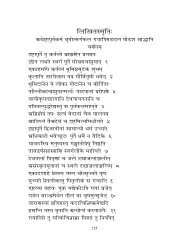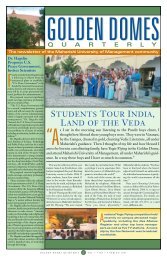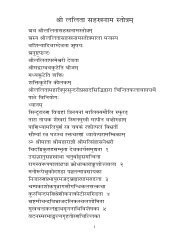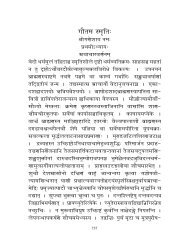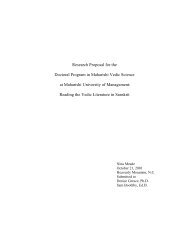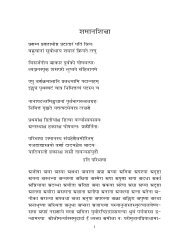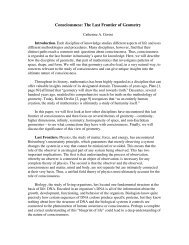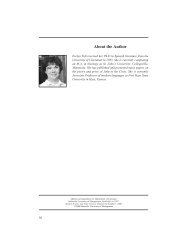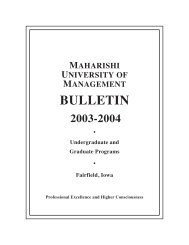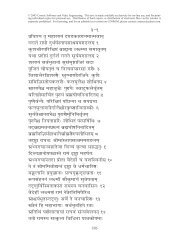Self Study - Maharishi University of Management
Self Study - Maharishi University of Management
Self Study - Maharishi University of Management
Create successful ePaper yourself
Turn your PDF publications into a flip-book with our unique Google optimized e-Paper software.
18 S E L F - S T U D Y R E P O R T 2 0 0 9<br />
U N I Q U E C U R R I C U L A R F EA TU R E S:<br />
D E V E L O P M EN T A N D S T U D Y<br />
O F C O N SC I O U S N ES S<br />
DEVE LO PME NT OF CONS CIO US NESS<br />
Success in school and success in life depends on qualities that are usually not developed<br />
systematically through the university curriculum: creativity, alertness, intelligence, broad<br />
comprehension together with sharp focus, emotional maturity, energy, and self-confidence.<br />
Scientific research over several decades has shown that each <strong>of</strong> these characteristics develops<br />
systematically through our curriculum. This development takes place primarily through the<br />
Transcendental Meditation and TM-Sidhi programs. (Please refer to Scientific Research on<br />
<strong>Maharishi</strong>’s Transcendental Meditation: Collected Papers, Volumes 1-5 in the Resource Room.)<br />
THE TRANSCENDENTAL MEDITATION PROGRAM<br />
The Transcendental Meditation technique is a simple, natural, effortless mental procedure<br />
practiced for 20 minutes twice daily sitting comfortably with eyes closed. The technique gives the<br />
natural experience <strong>of</strong> restful alertness. Mental activity settles down while the mind remains<br />
awake, physiological activity settles down and one experiences a deep state <strong>of</strong> rest, and brain<br />
functioning becomes highly coherent. Physiological research on the Transcendental Meditation<br />
technique has identified this state, termed transcendental consciousness, as a fourth major state <strong>of</strong><br />
consciousness, distinct from waking, dreaming, and deep sleep states. (For further information,<br />
refer to the brochure Summary <strong>of</strong> Scientific Research on Consciousness-Based Education in the<br />
team’s materials and the research volumes in the Resource Room.)<br />
Detailed descriptions <strong>of</strong> transcendental consciousness are given in the traditional Vedic<br />
literature, as systematized by <strong>Maharishi</strong> Mahesh Yogi in his Vedic Science. These descriptions<br />
identify pure consciousness as a field containing the total potential intelligence <strong>of</strong> mind and body,<br />
the basis for the full development <strong>of</strong> brain functioning in higher states <strong>of</strong> consciousness. The<br />
experience <strong>of</strong> this inner field <strong>of</strong> silent, pure consciousness has also been described by people<br />
throughout history and throughout the world. (For further information please refer in the<br />
Resource Room to “Modern Science and Vedic Science: An Introduction” in the journal Modern<br />
Science and Vedic Science, vol. 1, 1987, pp. 5–26; and <strong>Maharishi</strong> <strong>University</strong> <strong>of</strong> <strong>Management</strong>:<br />
Wholeness on the Move by <strong>Maharishi</strong> Mahesh Yogi, pp. 19–79 and 204–214.)<br />
Physicists specializing in unified quantum field theories have investigated the correspondence<br />
between the field <strong>of</strong> transcendental consciousness and the structure and dynamics <strong>of</strong> the unified


